
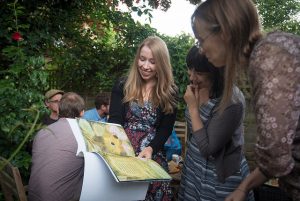
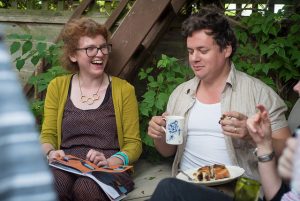





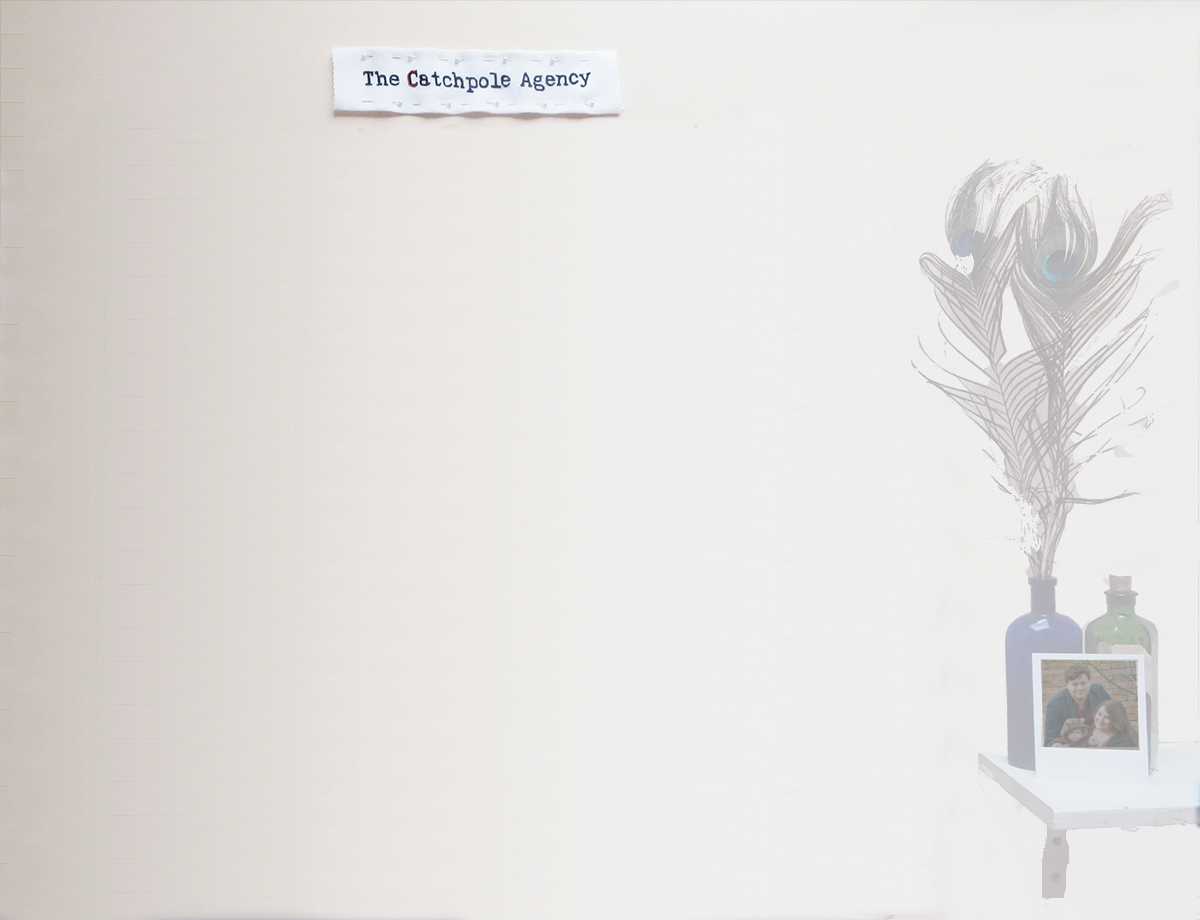















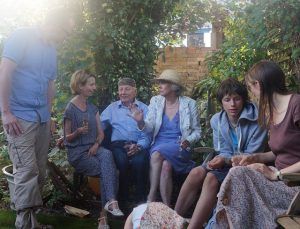
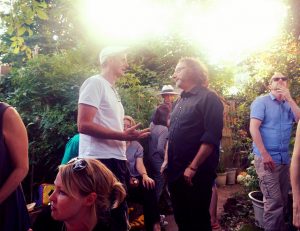



From Picture Book Den, 4th February 2013
There are many good things about working in children’s literature.
One of them is how frequently you find yourself having earnest, reasoned conversations about not entirely reasonable things, like whether, if anthropomorphized fruit have arms and legs, cheese and eggs should too. (A reasonable conclusion turns out to be yes, but not sausages or frozen chickens – that would be weird.)
Another good thing is how that precious, childish, ragged edge of fantasy does – somehow – find its way from an author’s pen, via the stewardship of an agent, right to the top of one of those great glass cliffs in London (into which all but a few of the smaller publishers have now been subsumed), so that still, when you sign in at the desk in the sterile, corporate lobby and take the lift to the 14th floor, the clean-lined, pale-toned, open-plan office that greets you nevertheless bears its happily incongruous traces, in shelves upon shelves of beautiful, colourful, anarchic and fantastical books.
But maybe the best thing about working in children’s literature is simply the range of storytelling. True, not all subjects and not all human experiences are covered here (no sex, most obviously), but the power and breadth of children’s fantasy – fantasy as real for them as reality is for us – more than compensates. And subject isn’t everything. Think of the range of ways a story can be told, and must be told, in order to enthral someone almost fully grown, and someone so small they’ve barely begun to be.
So this range and variety might be the best thing of all, I think: to be able to work on a picturebook in the morning, and a novel in the afternoon. And probably best in that order, because there’s something special about picturebooks that sharpens the tools of storytelling (and in my case, editing).
Picturebooks are how our agency began. Celia studied to be a visual artist – a sculptor – and has used that trained eye to spot talent in illustrators, and help them develop it. I hope I’ve inherited some of her instinct in that regard, to compensate for a lack of formal training in the visual.
My training was in words, and in music, a useful diversion so I later found, because it helps hone a sense of narrative in the abstract. Composers think of narrative structure in abstraction, ABACA. Writers often conceive of structure more instinctively or superficially, but the deeper, unconscious structure of storytelling is there all the same, hidden beneath the surface flow of paragraphs and chapters.
Picturebooks, like the simplest musical forms, impose a rigorously explicit structure on narrative. Thirteen and a half spreads to do all that a story (or a piece of music, in fact) has to do: establish a home, complicate matters, leave, and then resolve and return. And somehow that little journey has to intrigue and absorb us, carry us along, move us and then finally satisfy us.
Novels, like symphonies, may go here and there, may slow to a crawl then tear ahead to the finish, but picturebooks have no room to meander. As with poems, in the best picturebooks, every word earns its place. Picturebooks are the art and the science of storytelling distilled to their essence.
And maybe, after all, that’s the best thing about working in children’s literature: that ideal alchemy of wild, ragged fantasy, and the formal discipline of narrative, which picturebooks in particular mix and brew so well.
– James Catchpole

From Picture Book Den, 26th January 2016
This is a story about a side of publishing authors probably prefer not to think about. It may have a moral, but if it does we don’t know what it is. It may be a cautionary tale of sorts, we don’t know – we haven’t got to the end yet.
Sometimes an author has a really great idea, one that seems to spring almost fully formed, that makes you wonder “how hasn’t this been done before?” Sometimes, that’s because it has. So as an agent, I check. This particular idea – we’ll call it ‘This is NOT a Happy Agent’ for now, because using the real title would scupper any chance of a happy ending – had not been done before. It was 2012 and this was an original idea for a picture book text, with an original title – a title that ran through the thread of the story, a title that summed up the text and was repeated like a fabulous, memorable refrain. One you could imagine children chanting along with their parents.
Agents may be characterised as soulless money people, but don’t believe it – it is exciting when you see a text like this. And especially so when, as in this case, it was by an unpublished author (let’s call him, er… Dave) who I’d only just pulled from the submissions pile. I thought this story could (nothing is sure in this business) break this young author. I read it to my wife. She was impressed. She is not easily impressed.
So I did what an agent does – I took this shiny new text around to all my best contacts. I took it to Bologna and read it out to all the major publishers. Sure enough, it was pretty damn popular. Some editors passed on it regretfully, others held on to it gleefully and passed it around the office – to their team, to Sales, to I don’t know who else. That’s the way this business works.
Reading this back in the context we’re now in, it seems strange to me that the industry does work this way. A new author, an original idea, and what do I do with it? I go and shout this original idea around the assorted editors of New York and London. But until this month, this way of working hasn’t ever seemed strange to me. This is just the way it is. The industry works on trust. It has to.
‘This is NOT a Happy Agent’ (ahem) was indeed bought – back in 2012 – by a big US publisher (hooray!). I was excited, the author was excited.
And then, for various reasons unrelated to the quality of the text, things kinda stalled. The editor who’d bought it moved elsewhere, the illustrators the new editor wanted weren’t available… Now, in 2016, they’re still looking for an illustrator. Frustrating, but not hugely surprising – it’s the way it goes sometimes – picture books can be a long game.
Skip forward to two weeks ago, when something odd happened. “Isn’t ‘This is NOT a Happy Agent’ one of Dave’s books?” my wife shouted through to me. Yes, so? “Then why is there a photo of a book on Twitter called ‘This is NOT a Happy Agent’, by someone else entirely?’ Oh.
I had absolutely no idea. I knew this couldn’t be our author’s book. But sure enough there it was – a photo of an advance copy of a book with exactly the same title, but with another author’s name, sitting on Twitter. I know the editor who’d posted the picture well (she’s lovely btw). She works for a big London publisher – er..Goliath Kids UK? that’ll do – which is actually the sister company of Dave’s publisher in the US.
So here it gets murky. Because as I said, I showed ‘This is NOT a Happy Agent’ to everyone. In fact, I’d read it out to Goliath Kids UK back in 2012, and discussed it with their editors a few times since.
So what had happened? A quick search told me that yes, Goliath were bringing out ‘This is Not a Happy Agent’ – by their own author (let’s call him John Smith) – in March. 6 weeks’ time as of writing.
I emailed the editor and her boss. They were clear: the title was not their author’s idea, it had come from within their own team. I suppose they didn’t want me to think their author might have plagiarised it somehow, from mine. This hadn’t crossed my mind – they’d never met, I’d checked. And anyway, much more logical to suppose it was Editorial’s idea, given they’d actually heard the title before.
I reminded them. They seemed to take it in their stride. So would they change their title? No.
To say this is frustrating is an understatement. Whether consciously or unconsciously, it’s more than likely that my author’s title was plagiarised by Goliath Kids UK. What’s worse ‘This is Not a Happy Agent’ seems in no way organic to their story. Their story is totally different to ours. Applied to theirs, it’s just a catchy title, whereas it runs through ours like words through a stick of rock.
But if Goliath go ahead and publish, Dave’s title will most likely have to change – can you really have two picture books with identical titles coming out within a year or two of each other? And in losing the title his story will lose a prime part of its cachet.
Dave has had other ideas since then, and after a couple of years of trying, late last year I suddenly sold four of his texts in as many months to two top London publishers. I’m sure it’s going to happen for him. But now I’m starting to wonder…the four texts I’ve just sold were seen by other publishers besides the ones who bought them. What’s to stop their titles or their ideas being stolen before they come to be illustrated and published? How should I advise my author? What should we advise our many other authors, all of who rely on this same trust?
Perhaps this trust doesn’t really exist. These are all good people we’re dealing with here, and we all know how easy it is to come up with someone else’s idea while believing it’s your own…But that’s why you check. Perhaps there just aren’t any systems in place within publishers to stop things like this happening? And once they have – as in this case – it’s just handed over to Legal (watch this space…).
But can it really just be a question of whoever publishes first? That all feels rather Elizabethan. Or does it happen, and we just don’t hear about it? Am I breaking some unspoken rule of the industry in discussing this? (Maybe!) Do I need to guard my clients’ ideas more heavily in the future?
In that case, maybe all that will prevent a publisher from plagiarising is the threat of reputational damage? In which case, perhaps the best thing I can advise a new author to do is the most counter-intuitive. Should they actually go public? Should they blog and tweet about the titles they’ve sold, put it all out there on public record online? (Not unprecedented, these days…) Should they not rely on privacy and trust, but lay down a challenge: here are my ideas, here I am laying claim to them.
That could present a whole lot of new problems for the industry. But I suppose at least it would take a brave publisher to claim so publically an idea that wasn’t theirs in the first place.
James and Lucy Catchpole
P.S If a picture book actually called ‘This is NOT a Happy Agent’ appears in the bookshops, you heard it here first – we will be cross.